THE TIME IS NOW, THE PLACE IS ALGERIA
After almost a decade of bloody unrest, Algeria is starting to see the beginning of the end of the crisis that cost the country over 100 000 victims and weakened its economic potential worth billions of dollars in material losses. Since President Abdelaziz Bouteflika established the "civil concord" in 1999, peace and stability is slowly settling in Algeria.
''President Bouteflika is making statements and gestures that demonstrate a real opening, both on the internal level, and on the international level, concerning Morocco, the Middle East and our country,'' said Foreign Minister Hubert Vedrine of France to the International Herald Tribune. ''It is a radically different situation. The climate has changed. A breath of freedom has returned to Algiers.''
Today, the greatest challenge for Algeria is to successfully enter the world economy, to counter its huge unemployment figures and develop investments in all economic sectors. The President's program envisions a diversification of the economic environment, the introduction of political reforms within public institutions, and the rehabilitation of justice and human rights. What Algeria needs, however, is new capital to boost its impaired economy. It is precisely in this area that foreign investment and capital can play a major role in an emerging market like Algeria's in transition towards a fully liberal economy.
PRIVATISING OR NOT?
Recent protests by the Kabyle people in Algeria have been marked by a common theme: the desire to move ahead and develop a country that is democratic, modern and prosperous. Moved by these urgent issues and willing to diversify its exchanges, the only solution for Algeria is to encourage economic growth and pursue its economic liberalization, which started in 1990. This will enable Algerian companies to pull out of economic stagnation, and attract foreign investment in all sectors. Commonly known in Algeria as "second generation reforms", this program aims at radically changing State-run companies' environment by introducing administrative flexibility, lowering fiscal pressure, and most importantly by disengaging the State from all economic sectors. The State would thus serve a controlling and regulatory purpose. With this objective in mind, President Bouteflika formed a government with the eight coalition parties that support him, while awarding the key portfolios of Finance, Privatization, Trade and Energy to personalities of his entourage. According to President Bouteflika's program, the government promises to change economic regulations to make them more attractive, while encouraging partnerships and privatizations to revive the ailing public sector.
This last point is not simply an ideological choice: the State is Algeria's largest employer, with a total of more than 3.5 million civil servants relying on the public sector. To keep these companies alive, the State spent about $10 billion during the past ten years in a number of financial restructuring operations, but unfortunately economic growth did not follow.
It is therefore up to the Prime Minister, Ali Benflis, and the Minister of Participation and Coordination of Reforms to implement the modernization and privatization of the public sector. Everything is up for review; the previous government structure, with five public holdings that hold all the capital of public companies for the State, will be completely re-structured, and privatization will be dictated by new government policies.
According to Hamid Temmar, former Minister of Participation, and current Minister of Trade, "everything can be privatized, by selling it completely or partially through shares or management contracts". The objective is not to privatize for the sake of privatizing, but "to transform the Algerian economy and change the country's economic system. Given that most of the industrial sector is in the hands of the State, the transformation of the public sector through privatization aims at modernizing the national economy and increasing its production capacity."
Temmar calls on investment banks specialized in the relevant sectors to take part in the process. He believes that one third of all public companies must be privatized "with complete transparency".
"The short term objective is to privatize a minimum of 60 to 70 companies within one year to enable us to measure our own capacity and test the market."
This optimism might sound good, but nothing is worth concrete actions. In January 2000, when Temmar was poised to change a number of laws that hindered the acceleration of the privatization process, he hit a wall. A conflict arose on this issue between him and former Prime Minister, Ahmed Benbitour, who sided with labor unions and public managers by opposing the implementation of painful privatization measures.
The current Prime Minister, Ali Benflis, is open to change but also weary of angering labor unions, and this year Temmar started a long consultation process in an effort to reach a consensus. "After sending the reform bill to the trade unions and management boards for discussion, the Government will take their opinions and advice into account." The opposition to Temmar's reforms is mainly led by the UGTA (the General Union of Algerian Workers), the main trade union in Algeria with 1 million members. It was the UGTA who organized a series of general strikes last March to protest against the Government's project to privatize Sonatrach, the national oil and gas company.
Today the rhetoric has already changed, and there are no longer talks of radical privatizations. "Partnerships" is the new catchword, and it looks more and more like Algerian government policy is leaning towards a gradual opening of State companies, preferring strategic partnerships and joint ventures to the painful and complicated process of privatization.
Certain state-owned companies are even looking a shortcut: informal partnerships for specific business ventures. "When we talk about a large company like SNVI (the National Industrial Vehicle Company, a vertically integrated bus and truck manufacturing giant), finding a partner is never easy", says Mr. Benslimane, General Manager of the Manufacturing and Electricity Holding Company, HOMELEC. "It is easier for us to find a foreign investor who will collaborate with us for specific business ventures, like the manufacturing of television components with ENIE (the national television and VCR manufacturer), car or truck parts with SNVI, or public works material with ENMTP."
Recently all government holdings, including HOMELEC, have been dismantled to create smaller, sectorial equity management companies. Privatization Minister, Noureddine Boukrouh believes that this measure will speed up privatization and attract new investment to the country.
"At the end of the day, our preference is a positive result", adds Benslimane, who has been tirelessly leading an international outreach strategy to transform Algeria into a manufacturing hub for European markets.
Whether referring to "privatization", or "partnership", GIPEC(Groupe Industriel de Papier et de Cellulose) is also at the forefront of this liberalization trend. Algeria's leading pulp and paper company is streamlining its operations, and modernizing its facilities in order to meet an increased demand for paper-based products. "Today, Algeria consumes over 420.000 T of paper - the equivalent of USD 200 million worth of business", says Mustapha Merzouk, Managing Director of GIPEC. Although GIPEC has a production capacity of 300.000 T, a good deal of the local market is supplied by imports, so Merzouk is working to develop local production in an effort to decrease costs, and increase GIPEC' s market share. Plants are being upgraded and foreign consultants have also developed a business plan for GIPEC. "Our corporate strategy is to open the Group to national or international partnerships, to develop a privatization plan, and of course, to improve our management and customer services". This three-fold plan seems to be the right direction for GIPEC, consolidating its potential while opening its doors to investors.
PARTNERSHIPS AND JOINT VENTURES: THE WAY AHEAD
As the Algerian energy sector changes, so is Sonatrach. Among the 17 divisions currently evolving within the fields of engineering, project realization and petrol services, none are more important than the following four companies: ENTP, GCB, Enafor and Naftal.
ENTP (Entreprise Nationale des Travaux aux Puits) has accumulated over US$ 100 million in sales, and is currently ranked as the 16th most profitable enterprise in the country. The leading contractor for oil drilling in Algeria was created 33 years ago, and has consistently generated substantial profits over the past six years. Along with its subsidiary, DECO (a partner of Deutag), ENTP secures strong performances for Sonatrach, Anadarko, Cepsa, Occidental and Arco in the categories of petroleum maintenance, transport and catering.
Mr. Krissat, Managing Director of ENTP, confirms: "Our goal is to maintain our leadership over all drilling work in Algeria. To achieve this, we must enhance the quality of our technical capacities by appealing to one or more of our financially secure and technologically advanced partners". Finding investors should be easy. Kissat lists his company's assets with the confidence of a true oil baron. "Our outfield staff has an average of twenty. We have at our disposal an advanced logistics of accompaniment that encompasses all aspects of drilling - from monitoring performance to the maintenance and transport of equipment to catering, which plays a decisive role in desert areas". Krissat has high expectations for the privatisation of Sonatrach (of which ENTPis a branch). He believes that it would be necessary to put in place a "program to stabilize, streamline and secure the take off of its branches without damages nor disorders." Though this process might take some time, he states that "ENTP is no longer in a position to self-finance the modernization and renewal of its important equipment as well as supplying its markets. To sort out this issue, we are authorized and ready to open our capital".
"In short we are wishing that ENTP' s privatization could lead to a dynamic win-win opportunity for expansion", adds Krissat.
Meanwhile, GCB, a company specialized in civil engineering and infrastructure, is developing a similar position. According to GCB's Managing Director, Abdelhamid Zerguine: "the development of GCB cannot take place outside of the greater goals of the government which involve the letting go of all potential spheres. GCB will be more inclined to move forward faster than some other branches because of its healthy financial situation. Future shareholders will have the chance to manage a company that grosses annual profits of US$ 19, 000". While annual profits such as these one are enough to make any investor salivate; the fact that GCBhas multiplied its sales by 20 in the last ten years (for a current net revenue of US$ 1.9 million) should induce foaming at the mouth. As the liberalization of the sector approaches, GCB stands on the threshold of becoming an international-quality brand by virtue of its association with world class engineers combined with heavy investment in everything from hydraulics to railways to dredging of ports.
"At present GCB is looking for a joint-venture with an eventual partner. We are open to the joint creation of a new corporation, in addition to the sale of capital ownership," adds Zerguine. In order to modernize its operations, GCB is presently attempting to partner with an equipment leasing company.
"Liberalisation in the energy and mining sector has certainly created a more competitive environment", says Daoud Sahbi, General Manager of ENAFOR, the national drilling company. "Competition is increasing, and the challenge is now to maintain our leading position in the market." In order to compete on an international level, an investment renewal program was initiated by ENAFORin 1992, new technologies such as horizontal drilling and re-entry drilling were adopted ", adds Sahbi.
Besides the development of new partnerships, ENAFOR has recently established a new mining subsidiary together with the Italian industrial giant ENI. "We are reducing costs, building more wells and discussing various partnership opportunities with foreign companies in order to create new alliances" says Sahbi. "We are definitely open to all forms of partnership". With predictions by the Minister of Energy and Mines that petroleum production will increase by 50% during the next three years, it is clear that business opportunities for drilling activities will only continue to increase in the years to come.
On the other hand, with 10% of its sales volume in Algeria - the only market where presently active, Naftalis enjoying a leadership position in the distribution of Liquefied Petroleum Gas (LPG). The sale of
fuels constitutes 78% of total sales, of which 80% take place at the 1650 petrol stations distributed throughout the country. Part of the same industrial group as Sonatrach and Naftec, Naftal posted sales of US$1.8 million for its annual output of 1,2 million tons of LPG. The company has a workforce of 29, 000 employees and storage capacities of up to 800,000 m3.
Unlike Sonatrach and Naftec, and it order to retain its dominant market share once the sector is liberalized, Naftal must develop new upper-level marketing strategies on its lubricants, asphalts and pneumatics.
Naftal Managing Director, Hocine Chekired says: "we have set a five-year infrastructure development plan of about US$ 400 million. This program requires a very reactive management and a dynamic partnership. We are looking at a range of projects for which the modernization of our storage and transport equipment is of the utmost importance".
In order to increase its potential, Naftal is mapping out its development program together with Sonatrach. " Our goals can be achieved by capturing new sales opportunities for refinery products," states Chekired. " Our capacity for the production of large consumer goods can result in perfectly exportable surpluses like gas oil with a low sulphur content, which is a very competitive product in the western markets". With regard to foreign operators, Chekired believes that "the modernization of pipelines and other structural innovations will pave the way for partnerships as well as technological exchanges". Naftal is just as eager to attract private investors for LPG market activities on a national as well as international level, seeing as "the fuel continues to penetrate the market at medium term".
ALGERIA´S BLACK GOLD INVESTMENT OPPORTUNITIES
Algeria has undoubtedly prospered thanks to its incredible oil and gas reserves. However, it is known that the predominance of hydrocarbons in Algeria's economy is contributing to its fragility.
" Algeria is reestablishing touch with business ", contentedly declares Chakib Khelil, Algerian Minister for Energy and Mines, who is in charge with the mission to develop this sector towards new heights and partnerships.
Indeed, Khelil' s mission is extremely delicate, given the strategic importance of this sector and the revenues that allow the economy of the country to thrive. For the year 2000, out of the US$ 20 million in hydrocarbon export sales, US$ 13 million supplied the foreign currency reserves. This amount will partly be allocated to the servicing of the debt (US$ 5.61 million), the food bill (US$ 2.5 million), and to the payment of imported goods, services and equipments. Moreover, stability within the oil market has enabled the Algerian government to increase public sector investment by 17.3%.
There is, however, a downside to Algeria's independence on the petroleum sector. Since 96% of the country's revenues are generated by the export of hydrocarbons, the economy has by extension become highly sensitive to fluctuations within the oil market. After the enthusiasm of the seventies when a barrel was worth US$ 40, this dependence was bitterly felt with the price of the barrel collapsing in the mid eighties. The country fell into recession and its external debt almost doubled from US$ 18.4 million to US$ 28.6 million between 1985 and 1989. It became evident that before even adopting structural adjustment therapies, Algeria's only solution was to increase its oil revenues by developing its exploration and exploitation capacities.
Ever since its decision in 1971 to nationalize the hydrocarbon sector, the government has maintained a monopoly on all oil activities. Later, with the introduction of limited partnerships in 1986, and the Ghozali Law in 1991, foreign corporations were increasingly able to enter the industry via research and development partnerships with the national petroleum company Sonatrach. These new laws enabled Algeria to enhance its revenues by signing contracts with over thirty companies (mostly Americans) specialized in the exploration and development of gas and petroleum resources.
Although the Algerian constitution still uphold State control of the energy and mining sector, the government is preparing what is called "second generation reforms" - a legislative package favouring private (especially foreign) investments within the energy and mining sector from 2001 to 2005. "In the past explains Khelil everything was strategic - mines were strategic, electricity was strategic, petroleum was strategic... But concepts have changed. Today, our greatest strategic element lies in our human resources".
LIBERALIZING THE OIL AND GAS SECTOR
The major business opportunity to look out for is Sonatrach, the national company in charge of the transportation, and commercialization of hydrocarbon. Since its creation in 1971, Sonatrach has been able to maintain a quasi-monopoly of the hydrocarbon sector. By 1991, the company had managed to secure all the country's oil investments, and by 1999 it was posting sales of US$ 14.22 million. Today, Sonatrach is the largest exporter of natural gas in Africa, and the third-largest exporter worldwide with an output of 60 million cubic meters per annum.
As the State-owned oil and gas operator, Sonatrach has led the country to huge oil and gas discoveries in the Sahara desert. Today, new government policies are oriented towards the liberalization of the hydrocarbon sector, and the opening of Sonatrach to foreign investment.
According to Abdelhak Bouhafs, former General Manager of Sonatrach, "this is a gradual process that will be completed within few months. The decisive stage will come when Sonatrachis no longer permitted by law to be the sole and exclusive partner to foreign companies involved in Algeria's oil exploitation. Once an agency is created to advertise and negotiate all contracts on behalf of the State, then Sonatrach will become a company like all the others".
Bouhafs adds: "2001 will be a crucial stepping stone in the company's transformation as for now, it will only have an industrial and commercial mission." On a legal level, Bouhafs indicates that it will be important to "separate the role of State as shareholder in Sonatrach, and the role of the State as a regulatory body, which has to partially oversee the market. This transformation can progress faster or slower according to the evolution of mentalities, but there are hints showing that they are evolving."
The deadline set to reform Sonatrach culminates in 2005. "Sonatrach has first to become a company without government interference. Once this condition satisfied, it can either be partially privatized, or opened to an IPO (Initial Public Offering) on the stock market".
A new Hydrocarbons Bill will mark the end of the State monopoly, hence transforming Sonatrach into a private company, and delegating all regulatory responsibilities to ALNAFT - the agency that will act as technical controller, tax inspector and negotiator on behalf of the State. The Bill also plans to downsize Sonatrach, laying off at least 30% of its employees and opening part of its capital on the stock market.
The proposal prompted the resignation of Sonatrach' s General Manager, Abdelhaf Bouhafs, on grounds that this was too much too soon. But this time, the government stood out, and after intense negotiations with the unions, the Hydrocarbons Bill is moving ahead.
For foreign oil companies the adoption of this bill will free them from Sonatrach' s current monopoly. Previously, foreign oil companies had to enter in association with Sonatrach before they could invest in Algeria.
As a result, Sonatrach established mining partnerships with Anadarko, Alpeco, Agip, Arco, Bhp Hamilton, Cepas, Plus Petrol, Mobil, West Oil, Repsol, Petro Canada, BP, Petronas and Neste Oil for instance.
In addition, the bidding process for new exploration blocks will become more transparent and efficient. Previous negotiations could last for years - for over two years PetroCanada was in negotiations with Sonatrach for the development of one of its fields, and never even reached an agreement.
"A more predictable and more reliable quicker decision-making process will make business even more attractive in Algeria. It will also continue to demonstrate that the hydrocarbon sector is a model for foreign investment", said William D. Sullivan, Anadarko Vice President for International Operations.
Fodil Hadibi, President of BJSP, agrees with Sullivan. "This new system is totally on line with our strategy because it will increase the speed of tender offers and of contracts completed. This will also translate into a faster execution of drilling, which will allow us to build a greater number of wells in a shorter amount of time."
BJSP, a joint-venture company between BJ Services USA and ENSP, Sonatrach's petroleum services company, is a success story in itself, directly competing with international heavyweights Schlumberger and Halliburton, and holding its own with 28% of the total petroleum services market. "Our joint venture has allowed us to maximize American know-how together with the local expertise of an Algerian company... It is a perfect marriage that has brought together two cultures, and helped us to evolve and succeed."
Hadibi is bullish on the future of BJSP. Not only has the company increased its capital from $5 million in 1986 to $7 million today, but profitability is up to 18%, and new opportunities are up for grabs. BJSP is not only expanding vertically through new partnerships, but also expanding horizontally to increase services and market share. "We are extremely excited about the future of Algeria's oil and gas prospects," concludes Hadibi.
MINING FEVER
Another primary concern of the reforms is the mining sector, which has already taken steps towards liberalization. Chakib Khelil, Minister for Energy and Mines, notes: "although it has not yet been possible to sell nationally-owned mines and quarries to the private sector, they have been given to public enterprises in the form of concessions. We are also passing new regulation that will allow operators to exploit concession sites for a limited period of time. Five amendments have been proposed for the mining law, the most important of which involved the suppression of discrimination against foreign investors."
The concessions should allow local and foreign investors to invest in the exploration and exploitation of the untapped mining resources. Apart from the traditional iron, salt or marble deposits, some 32 additional mineral deposits have been identified; among them mention should be made of gold, wolfram, tin, silver, diamonds, mercury, as well as precious and semi-precious stones. Seven public companies are presently exploiting and marketing these minerals: FERPHOS, ASMIDAL, ENASEL, ENAMARBRE, ENOB, ENOR and ENG. In 1997 and 1998, the country experienced a slight improvement in iron production (+ 131 million tons), phosphate (+ 87 million tons) and salt (+ 35 million tons). It is worth noticing that FERPHOS produced 1,155 million tons of phosphate in 1998, when its production capacity is about 1,500 million tons. Given the importance of the Algerian mining sector, none of these public enterprises has on its own the financial strength to develop new deposits. The State being not in a position to pump money into these companies, the government had no alternative but to open up to local and foreign investments.
Looking now at the reserves, they have been estimated at 3.5 billion tons for iron, 2 billion for phosphates, 1.6 billion for lead-zinc and over 1 billion tons for salt. Regarding marble, reserves are over 24 million m3 (its production only exceeded 35,000 m3 in 1999). Most of the deposits are under-utilised, while a fair number have been left aside.
As far as concessions are concerned, small and medium sized mines were primarily targeted, leading to the concession of 24 mines, with 15 deposits in the North of the country (marble and decorative stones), 11 deposits at Beni-Abbes and at In-Salah (clay), 4 deposits at Tlemcen and M'Sila (plaster), 5 at Tizi-Ouzou, Tipaza, Saïda (beryllium), 6 deposits of sand, 2 deposits of zinc, 1 of copper, 9 deposits of salt and finally 3 deposits of gold of which two are in the South and one at Boudouaou.
The State's key instrument for the liberalization of the mining sector is the ORGM (National Bureau of Mining and Geological Research).The mission of this organization is to oversee all public service related to geology, from mining exploration to promotion. The scope of ORGM' s activities includes commercial projects and joint venture partnerships, in addition to representing companies such as De Beers, BHP, Rex Mining and Breakwater Resources.
The company is further involved with mining concessions insofar as it is responsible for providing potential investors with the necessary information to make a successful bid. According to Mohamed Tahar Bouarroudj, General Manager of the ORGM, "the mining law does not distinguish between public and private investors, nor between national and foreign ones; it will allow the repatriation of the total investment in a mining project. Foreign mining companies will no longer have to be in partnership with public enterprises in order to invest in the mining sector." As to the effective opening of the market, which has already begun, Bouarroudj confirms: "in view of the positive results, a second promotional campaign of development for small and medium sized mines has been launched in October 2000".
Regarding future opportunities, Bouarroudj points out "foreign investors can expect numerous international tenders for the exploitation of diamond, gold and other basic metals."
When referring to the country's mining potential, the ORGMGeneral Manager considers that "one of the major trump cards that Algeria has in his hand is the existence of an important geological, geo-chemical and geophysical infrastructure"; this includes geological maps of the North of the country, on a scale of 1:50.000 covering about 80% of the cartographic landscape; those of the South on a scale of 1:200.000 cover almost 100%, as well as the geophysical maps taken from the air on scales of 1:100.000 and 1:500.000 (available in numerical forms) and also for the aero magnetic and aero spectrometric map. "The results of Algeria's thirty year exploration program have revealed important poly-metallic deposits (Pb, Zn, Cu), as well as deposits of gold, iron, manganese, mercury, wolfram-tin, tantale, uranium, phosphates, caesium, barite, marble and caoline; several zones with strong potential have been identified in the North and South of the country".
An important beneficiary, AGENOR(Agence Nationale pour la Transformation et la Distribution de l'Or) will process and sell the country's newly discovered gold production in the South of the country.
According to Mohamed-Seghir Benamara, Chairman of AGENOR, "the gold market in Algeria is about 10 metric tons a year". He adds: "we are positioning ourselves to capitalize on this new business opportunity; we are presently working with South Africans to adopt the latest technology, while looking for more partnerships." AGENOR is also developing other projects such as the refining of platinum, and has undertaken discussions for cyanide production (which should entirely be exported to the American market).
AGENOR is also ready to open its capital to a foreign partner. "The State suggested an IPO over 20%, but we can do much better. In fact we can sell up to 49% to a strategic investor, and we can also create subsidiaries - an option offered to a number of potential partners who might wish to keep their brand name" suggests Benamara.
ELECTRIFYING THE REGION
As in many developing countries, the liberalization of the electricity sector is a key step towards the development of a modern and efficient industry. In Algeria, the electricity and gas distribution sector will require an investment of $10 billion, of which $5 to $6 billion will go directly towards electricity generation. This sector is in need of a complete reform in order to open up to competition, and Sonelgaz, the national electricity company that holds the monopoly of the production, transport and distribution of electricity, is about to undergo some major changes.
Abdelkrim Benghanem, President of Sonelgaz, is taking the company to new frontiers that involve a step-by-step process to liberalize the sector. "The generation, transportation and distribution of electricity will all be separated. After that, Sonelgaz will be organized as an industrial group, holding the majority of shares of all subsidiary groups. Following a decision by the government, it is then expected that Sonelgaz will open its capital to strategic shareholders while keeping a majority of shares to be able to maintain public service for a period of 6 to 10 years."
In the meantime, "there will be a period of 3 to 5 years where all the intended bodies will be established, the most important being the regulatory body, independent from Sonelgaz. This body will issue licenses, building permits and will guarantee the regulation of the whole process. At this point, 30 to 40% of the rural electricity market in Algeria will open up".
And how is Sonelgaz preparing for such a shake up? By expanding, says Benghanem. "We intend to attract private capital, and to conquer the European market in partnership with Sonatrach." Not only is Sonelgaz building its electricity capacity through new projects for the production of electricity, the manufacturing of electrical material and accessories, the exploitation of copper mines, gas air-conditioning, and the development of natural gas fuel, but it is also setting ambitious goals to break into new markets.
"Within the framework of our new policy, we intend to create a single company essentially geared toward the opening of the electricity market in Europe" says Benghanem, with a spark in his eyes. "We believe that the European network, excluding Russia, is a market worth US$ 200 billion per year. We are at the doorstep of Europe, we have raw energy and we have ideas, so it is normal to consider that the European market should be within our reach."
BUILDING FOR THE FUTURE
The government's program based on economic diversification will particularly focus on public works projects, not only to prop up construction companies, which were badly affected by the recession, but also to drive down the country's unemployment rate, which presently stands at 30% of the working population.
The strategy is to instill some kind of health and confidence into companies within the public works in an effort to modernize and restructure their operations at the same time.
Belarbi Belkacem, General Manager of the Public Holding Réalisation et Matériaux de Construction, goes even further by stating that "the holding company is preparing a number of its entities for privatization. They are being prepared, not only by injecting capital, but also by restructuring them, and cutting out all extra costs or expenses. After that, these entities will be put on the market for sale to potential buyers. Otherwise they will start running as private companies facing competition with renewed strength and stability."
Speaking about this first privatization experience, Belkacem stated: "We put about 12 brickyards on the market, and I must say we were surprised to realize that local companies were starting to gain confidence and buying." As for future steps towards privatization, Belkacem is optimistic. He states that the Holding has 142 companies, which could be up for grabs; yet, this will depend on the drawing up of a credible privatization program that would enable the State to free itself from the least important companies".
Within Réalisation et Matériaux de Construction Holding, Sonatro is one of the most dynamic companies looking for partners. As a national leader in the field of public works, Sonatro recently come out of a 5-year convalescence period, and has recently started to regain confidence thanks to an increase in investments. Sonatro is presently developing its technological capacity for more efficient cost controls and better quality production through partnership contracts.
According to Mustapha Rebouh, General Manager of Sonatro, "the company has gone through difficult times. Today, we are presently working with an Italian firm, and we have contacted a number of French companies as well." Through investment or management partnerships, Sonatro hopes to build on its already strong position in Algeria's construction sector.
TELECOMS: CATCHING UP
With only 5% of the population equipped with a telephone, Algeria is ranked among the lowest countries in Africa in terms of telecom penetration. Poor phone connections, a limited cellular network and inefficient Internet connections have characterized the telecom sector until recently. Today the telecom sector represents a great hope for the modernization of Algeria - a crucial test for its transition towards a market economy. The development of the telecom sector is of prime importance to President Bouteflika, and to the government who called for World Bank assistance to successfully liberalize this sector. There are 7 million demands pending for telephone lines and about 700 000 for mobile phones.
There is great room for improvement, and serious reforms are planned; among the most significant ones, let's mention: the separation of postal services from telecommunications, the creation of a regulatory body for the telecommunications market, and the sale of a GSM license to an international operator.
Mohamed Maghlaoui, Minister of Postal Services and Telecommunications, started implementing a new telephone-number allocation program to increase connection capabilities, and to set up the framework for a new GSM network. He explains: "in 2002, we will open Algeria Telecom' s capital, a new company created in anticipation of the separation of the post and telecom systems. By the end of 2004, I expect the telecommunications market to be entirely open to competition."
The sale of the GSM license was the first test. Following an open tender process, Orascom Telecom won Algeria's first private GSM license on July 11th with a $737 million bid. Orascom Chairman, Naguib Sawiris, said his company would invest US$ 200 million in the next two years, and US$ 500 million over a five-year period. " We expect to become operational before February 2002 and, we are targeting 10 million subscribers by 2015 " stated Sawiris.
Now that the GSM license has been awarded, Moussa Mouselmal, General Manager of Alcatel (Algeria), will be looking at providing Orascom with the latest GSM technology and services. "Since we are not operators but equipment providers, what matters to us is to bring new Alcatel technology to Algeria, install it and supervise it."
"Algeria is a young country," adds Mouselmal "and although it needs 2 million GSM lines, it has only a maximum of 100 000. If we had these 2 million lines, they would be sold very easily. Algeria is an open country where a lot needs to be done, and at the moment, it needs 1 million fixed lines". Not only that, but "GSM technology must also acquire the necessary intelligence to be able to have prepaid phone cards, and fixed subscriptions ".
It goes without saying that Alcatel(Algeria) is also working to entrench its participation in the country's telecom sector, perhaps through a local partnership with Sonatite, the local telecom equipment company.
However, a company that has already established a strong presence through a successful joint venture is Ericsson. After first coming to Algeria during the 1960s, Ericsson developed a foothold in the local market before signing in 1987 a joint venture with SITEL, Algeria's leading telecom equipment supplier. At that time the national telephone network was hopelessly out-of-date: in 1998, 70% of lines were still analogue while equipment and exchanges were obsolete.
The SITEL-Ericsson joint venture has certainly been fruitful, proving that Algerian success stories are not only limited to the hydrocarbons sector. "SITEL is a good example of a strong local partnership" states Karl Asmar Ericsson's Executive Vice President for Central & Eastern Europe, Middle East and Africa. "In fact, SITEL is one of the companies in Algeria where you can talk about state-of-the-art technology."
The success story is not over yet. "SITEL already delivered a system for about 100,000 customers, which is not enough because demand is much higher, so now it is now a question of increasing our investment. In general, Algeria's penetration rate is very low, and could be much higher if the conditions were right."
With this in mind, Ericsson is helping to build SITEL from a purely manufacturing to a service-oriented company, and preparing it for a competitive environment in fixed lines and GSM technologies. Although SITEL will no longer enjoy its monopolistic status to supply and develop Algeria's fixed phone network, "we have a very good position and a strong presence in the market" says Asmar. Moreover, he believes that Algerian telecom sector can only move upwards. "We see tremendous opportunities here... We are not only determined to move with the market, but to take pro-active initiatives to promote and stimulate the economy. The young Algerian population is quickly adopting new European trends, and we feel that we are in a position to quickly move forward and develop this market."
LINKING ALGERIA BY AIR AND SEA
Transportation will also be a sector to watch out for, but the privatization process is complicated and could be lengthy. Indeed, all harbor services should be privatized, and the plan is for private companies of different origins to take over, while public authorities only play a regulatory role. Algeria has eight trade harbors and the Port of Algiers holds the most important piece of the pie, with 40% of the total trade traffic.
In this context, foreign companies such as Maersk and CGM-CMA are considering the opening, and the liberalization of the sector to be a good opportunity to expand their business in Algeria. CGM-CMA, a sea borne services company has been doing business in Algeria for more than a decade. Leader of the consignment in the year 2000, CGM-CMA, with a French capital of 10%, has transacted 20% of container traffic in Algeria. Lazhar Hani, General Manager of the company, believes in the capacity of the company to go forward "if the harbor activities are liberalized in Algeria. This would be a great opportunity for us to expand and diversify our business in many other different trades". Furthermore, another part of this liberalization is the privatization of the CNAN (Algerian Company of Seaborne Navigation) as well as the ENMTV (National Company of commercial Seaborne Transport). Indeed, in order to make up for their deficits and renew their decayed and insufficient fleet, the two companies have to yield part or all of their capital, thus giving up their monopoly in the sector.
In contrast to sea transportation, the reforms in air transportation have been more successful. Launched in 1998, and favored by the departure of all foreign airline companies in 1994 - Alitalia being the only major carrier that returned later - the privatization of this sector gave birth to many private airline companies, which have become real competitors to Air Algérie, the State owned Airline Company. Air Algérie could not meet international standards due to its limited means. So, newly born Algerian private airlines have embraced the change, and are working hard to satisfy an increasing demand. This boom brought about a wider opening of Algeria as well as an increase in international flight demand.
Thanks to better management and consistent financial means, as well as alliances with Tunis Air and Europa, Eco-Air is considered to be one of the new, up and coming Algerian airline companies. The field is open for competition, and for this reason Eco-Air is looking to consolidate its position through partnerships. "Though we have considerable financial means, we are still looking for a partner with consistent means, although our focus will especially be for the development of a management and technology contribution".
Created in 1999, and bought out at 100% by the Group Lakhlef, Eco-Air is in the process of expanding its services. "We have also signed contracts with leasing companies for a number of planes, not only to build a commercial fleet, but also to establish also a fleet intended only for oil companies in the South of Algeria". Although the situation is more and more challenging as the skies open up to greater competition, Lakhlef believes that the sector is still open for new business opportunities.
In fact, the major and actual challenger of Eco-Air is not Air Algérie but Khalifa Airways. Indeed, after 2 years of existence, Khalifa Airways has succeeded in capturing an imposing share of Air Algérie' s business.
According to Rachid Amrouche, Secretary General of the Khalifa Group, "Khalifa Airways will acquire 20 aircrafts before the end of the year in order to reinforce its present fleet. The company is in continuous growth, and has equivalent or even superior standards to those offered by foreign carriers. While keeping with long-term objectives, we will train 200 pilots in Oxford. Not only has Khalifa Airways purchased Antinea Airlines to boost its fleet, but the Khalifa Grouphas also built its own international airport in collaboration with foreign partners".
PRIVATE SECTOR BOOM
The Khalifa Groupis also the leading example of a private sector expansion in Algeria. Private management is increasingly acquiring more importance - a dimension never imagined only a few years ago. After being marginalized and demonized by public authorities due to archaic and bureaucratic proceedings inherited from the socialist period, the private sector has come back to Algeria.
The reinvestment of Algerian capital in Algeria is certainly a sign of local improvement, and today the private sector represents 60% of consumer goods and services, and employs more than 2 million people.
The strategy of the Khalifa Group has been to consolidate in the long run. "It has become imperative to rationalize our means, and think of other organization concepts" says Amrouche. "This was achieved through the creation of a financial holding, whose main activity is to control and manage the portfolios of all subsidiary companies to ensure consistent growth and development of all activities". Furthermore, "the private sector in Algeria is organized and managed in a very flexible way while having a great capacity for innovation".
There are many examples confirming this view. For instance, Fruital and ABC (Algerian Bottling Company) doubled their turnover thanks to lucrative contracts with Coca-Cola and Pepsi respectively. Another private sector company, Cevital, holds the biggest share of the vegetable oil production market and is poised to go public on the London Stock Exchange next year.
FINANCING FUTURE GROWTH
Private companies have emerged in different sectors, among them Union Bankand Khalifa Bankin the financial sector.
A major focus for most banks has been the development of small and medium size companies. "We know that SMEs contribute widely to the national added value in different fields of activity, hence our choice to give attention to this category" states Amrouche when talking about Khalifa Bank's focus. "Thanks to innovative products and services, we believe we can satisfy the needs of private individuals who have been neglected, as well as consumers and average employees who have the right to expect more."
Foreign banks have also seized the opportunity of SME financing, and with the arrival of Citibank, Natexis, Société Générale, BNP Paribas and Arab Banking Corporation, private Banks are starting to compete with public banks. While public financial institutions used to hold the monopoly for financing, investment and the economy as a whole, today they bear the brunt of the public sector collapse, posting a total deficit of 2000 billion Dinars, thus becoming completely drained with weak credit capacity. Therefore, to meet the financing and managing needs of investors, businessmen have turned to the private sector.
Union Bankis one of the most prominent merchant Banks in Algeria belonging to Chairman Brahim Hadjas. Created in 1995 and considered as the first Algerian private Bank, Union Bank increased its profits by 105% in 1997, before it had its foreign trade license suddenly revoked. However, three years later, Union Bank was able to get its license back.
"After the liberalization of the Algerian economy, the financial system was liberalized but the legal framework behind the implementation of financing instruments, apart from classical banking instruments, was non existent". After having fought to set up Union Bank, Hadjas is fully determined to develop the potential of Algeria's financial sector so as to provide the country with the necessary financing for its economic development. "We have to create our own businesses, and this requires a vehicle to allow foreign investment," so Union Bank is taking a leading role in offering investment services and funds.
The private sector is not only present in the world of finance with its own banking institutions, it is also in the field of insurance. According to a study conducted by the National Council of Insurance, the Algerian market should be eight times more important in the coming five years. Hadj Said, Chairman of L'Algérienne Des Assurances (2A)thinks there will be a "market boom" which will follow the country's economic development during the next 10 years.
"Personal insurance is a market opportunity that has not yet been exploited", points out Hadj Said. Although this market is limited to US$ 300 million per year, its potential in the long run is much greater, and local companies are getting ready for it. This is well illustrated by 2A, which has opened 80 branches, and is poised to further expand its operations next year. However, Hadj Said believes that "the laws regulating insurance activity in Algeria are not in touch with the economic situation of the country". He remains optimistic about upcoming reforms and insists that his "objective is to create a company with the same standards as foreign companies". He also adds that his company already has strong relations with Alliance, Suisse Ré, Score and Generali, as well as assistance contracts for international human resources training.
The dynamic and flexible aspects of the private sector are in stark contrast with the public sector. Public banks generally offer poor quality services, far inferior to international standards. Once again, the only solution to be considered is privatizing, a process that should intervene once the financial situation of these banks is reformed and restructured.
Within the context of private sector competition and privatization, CPA(Crédit Populaire d'Algérie) is probably the main bank in Algeria that is ready for restructuring. El Hachemi Maghlaoui, Chairman of CPAstates that: "everybody agrees that the public sector cannot compete with the private sector" at the present time. So Maghlaoui is conducting a campaign to reorganize CPA, restructure its portfolio and modernize its information system.
"Banking reform is already in progress, but the key element missing is partnership. To this effect, we have had talks and proposals from a number of very important international banks, which showed their readiness for a partnership with CPAregulated by management contracts. There is even a possibility for these foreign banks to participate in the opening of the bank's capital."
As far as the secondary market is concerned, the Algiers Stock Exchange, inaugurated in 1998, operates with only one quotation per week and four listed companies. The Stock Exchange is therefore waiting for a surge of IPOs from the privatization program, which could include twenty public companies on a public offer in the next two years.
GOING PUBLIC
In the coming months, ENAP (the National Paint Manufacturing Company) and ENGI (the National Company of Industrial Gas) will be listed on the Stock Exchange. Indeed, ENAPis ready to go public thanks to positive financial results, a production capacity of 150,000 metric tons, and a turnover of US$ 80 million. Created 30 years ago, ENAP holds 80% of the national market with its production essentially intended for the building industry, railroad and naval services.
Madjid Hassaine, Chairman of ENA Pexplains that "ENAP' s main concern is to find a partner, not a partner with money, but simply a partner who will help to develop, perpetuate our activity in Algeria, and extend our business to the whole African continent". According to Hassaine, the objective is to privatize and offer majority shareholding to a potential investor. They are selling shares up to 20% on the Stock Exchange, but Hassaine insists, "there is a need for a partner that could take 60% or 80% stakes in ENAP."
ENGI is in a similar financial situation. In 1990, they doubled capacity and increased quality controls in a time of recession. "In fact, we did even better since we created a company in 1998 in partnership with APMEL, the 5th largest gas industry in the world" adds ENGI Chairman, Lahocine Boucherit. "The plant started producing at the beginning of the year, and has just doubled its nitrogen production. Furthermore, we have just sealed a partnership contract with ILDI of Germany, a major gas company". These new partnerships will enable ENGI to expand regionally, with a foothold in the Tunisian market, and the potential to increase export operations. In the meantime, ENGIis in the midst of talks for partnership projects in the field of precious gas, services and development.
The development of the Algiers Stock Exchange will depend on the success of IPOs from companies like ENAP and ENGI, which will hopefully set a trend for all other companies under the State-owned CPS holding to go public as well. Abdelmadjid Attar, Chairperson of CPS (the Chemistry, Pharmacy & Services Holding co.), believes that "if privatization is only done through partnerships, the Stock Exchange will never develop. That is why companies should be listed step by step in blocks of 20%, in order to develop trading on the Stock Exchange".
This two-prong strategy, promoting partnerships while increasing the capital base of the stock market, promises to set the basis for an opening of the Algerian economy. It also aims at reducing hydrocarbon dependence through export diversification. Apart from oil and gas, Algeria exports less than US$ 400 million worth of mining products, agro industrial products, and fertilizers.
IMAGE IS EVERYTHING
Marketing in Algeria, either for the local market or the international audience, is also a new challenge. The shift from a socialist system to a liberalized economy has introduced new elements of competition, marketing and image branding.
In this new business environment, Algerian companies are starting to understand the importance of building their corporate image. They are taking baby steps towards the re-designing of their logos, annual reports and brochures, and starting to adopt marketing plans, targeted surveys and branding strategies. Through the Internet, companies are also taking advantage of the country's new web culture.
Start-ups and marketing companies are also popping up to meet this new demand, led by young Algerians who have come back from the US and Europe. Yet they all have one competitor in common: the ANEP, the State's publishing and marketing company that owns a strong distribution network across the country and aims at developing Algeria's huge consumer market.
"We cannot liberalize a country without developing its communications" says Abdelkader Khemri, General Manager of ANEP. " The liberalization of the Algerian economy is actually a result of a political process that encouraged free press and democratic expression".
The media giant was recently consolidated into GPC (Group Press and Communications), which has become an umbrella for a communication holding that is fully integrated, with design, publishing, printing, distribution and marketing activities. Now that marketing is no longer controlled by the State, ANEPis eager to maintain its impressive market share to develop its services through partnerships and, by outsourcing contracts for printing, outdoor advertising and market research, for example.
The image of the country is also a concern - and Khemri is challenging pre-conceived notions of Algeria in the international media. "Although there are certain images and afterthoughts which continue to prevent Algeria's development... I believe that we all have an interest in developing the country." According to Khemri, this begins by promoting Algeria as a safe investment destination, and ensuring that international readers receive a balanced view of the current situation.
REVIVING TOURISM
Promoting tourism will be the next challenge for the Algerian government. The civil war immersed the country in a long period of isolation from the outside world, travel warnings regularly kept tourists away and tour operators kept Algeria off the map. Even last year, the great Algerian Sahara desert - the main tourist attraction of the country - attracted only 15,000 tourists.
Yet with the return of peace in the desert and on the coast, Algeria offers an original cultural and geographical blend for eco-tourism that is unmatched anywhere else. Not only is it unexploited, but also it offers destinations to the Sahara desert in the South, and the long Mediterranean coastline in the North. Culture also reflects the huge size of Algeria through the unique Touareg lifestyle of the great Algerian South, the unique culture of the Kabyle people, and the untouched way of life in small villages.
Unfortunately, during the past twenty years, tourism was never a priority, but today the government has realized the importance of promoting Algeria as a tourism destination. The National Tourism Office, ONT, has finally developed a long-term tourism program, which aims at developing hotel infrastructure re-defining Algeria's image. "There is a dire need for investment to mobilize the necessary resources" comments Atman Sahnoune, former Head of ONT. "Structures and facilities date back to the 1970's, and must be modernized. Moreover, these facilities need new management structures requiring the creation of new products aimed at specific markets, all of which are part of the privatization package. In fact, the public sector as a whole is open for direct sale: stakes are open for sale as well as joint ventures".
One of the hotels to incarnate the present revolution in the tourism sector is certainly the Sheraton-Club des Pins. Paradoxically, this was the first global hotel chain to operate in Algeria. Going back to May 1999, Algeria entered the Starwood family with the grand opening of the Sheraton-Club des Pins in Algiers, an event that happened to coincide with the 35th annual summit meeting of the Organization of African Unity (OAU). In addition to hosting the 1999 summit, the hotel had the privilege of lodging the presidential delegations of all participating countries. Algiers has since been the capital city of many historical events and international conferences, most notably for the signing of the peace treaty between Ethiopia and Eritrea during which Madeleine Albright and Kofi Annan were present.
Today, the Sheraton-Club des Pins' success has prompted Sheraton to open two new hotels in the next two years: one in the Southern mining town of Hassi Messaoud, and another on the coastal city of Oran. Algeria was offering a unique opportunity to the Sheraton: to develop the hospitality sector, certainly high in potential but low in resources and expertise. After the Algiers' experience where the Sheraton-Club des Pins maintains an average 80% occupancy rate throughout the year, Starwood seems eager to push for what could be the Mediterranean's hottest new business and leisure destination.
The majority of local hotels, on the other hand, are in the unfortunate position of not being able to compete with an international brand like Sheraton. They have neither the name recognition nor the facilities that business people look for upon their arrival in Algeria. There is, however, one locally owned hotel still capable of giving the Sheraton a run for its money: the historical El Djazair. Built in 1789, the El Djazair hotel originally served as the residence of the Dey of Algiers. Following the French occupation, it was first transformed into guesthouse for British artistocrats, and then into the city's most illustrious hotel. The hotel has since received scores of celebrated personalities including Dwight D. Eisenhower ( who elaborated D day strategies during World War II from his room in the El Djazair ), Winston Churchill, Simone de Beauvoir, Rudyard Kipling and George Bush. Renovated in 1982, El Djazair hotel has managed to retain a timeless prestige that provides stiff competition for even the latest international chains to appear in Algiers.
It is a brand new start for Algeria's tourism sector, and everything is up for grabs. This is a theme that prevails not only in the tourism sector, but in every other sector as well.
CONCLUSION
In the 1980s the country's economy was in bad shape because of the former socialist system, then in the 1990s the civil war submerged the country into ten years of chaos and darkness.
Algeria now has to catch up with 20 years of underdevelopment, and the business opportunities are boundless. Not only is it a market of over 30 million people with a $50 billion GDP, but it also represents an economy that has, until now, been practically closed to foreign investment. Today there are only a handful of joint ventures partnerships (except in the hydrocarbons sector) across the country.
Major privatization deals might not be in the cards just yet, but strategic partnerships and joint ventures are opening up the economy, and offering the chance for international companies to enter a market that is virgin and eager to develop.
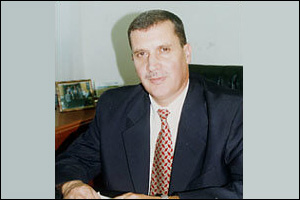 M. Hocine ChekiredDirecteur GénéralNAFTAL M. Hocine ChekiredDirecteur GénéralNAFTAL | 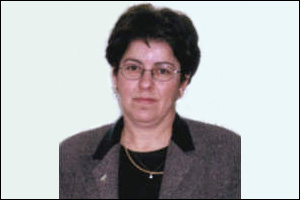 MADAME GAHANIA HOUADRIADirectrice Generale D'algerie PosteALGERIE POST MADAME GAHANIA HOUADRIADirectrice Generale D'algerie PosteALGERIE POST | 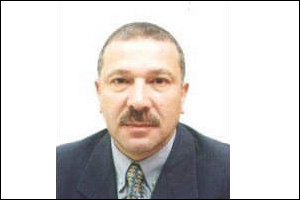 M. Akli TarzaltDirecteur Général de la G.C.B. GCB M. Akli TarzaltDirecteur Général de la G.C.B. GCB | 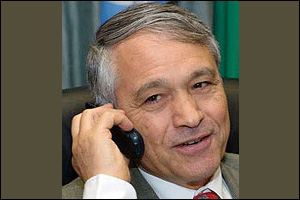 M. Chakib KhelilMinistre de l’Energie et President Directeur General de la SonatrachSonatrach M. Chakib KhelilMinistre de l’Energie et President Directeur General de la SonatrachSonatrach |
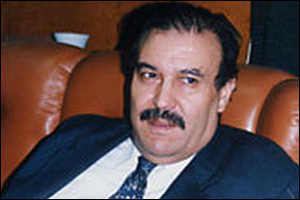 Mohamed Maghlaoui Ministère des Postes et des Télécommunications N/A Mohamed Maghlaoui Ministère des Postes et des Télécommunications N/A | 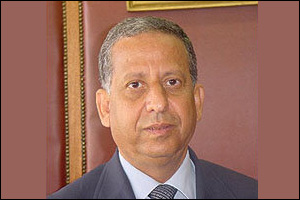 M. Abdelkader Khemri Directeur Général de l'A N E P Entreprise Nationale de Communication, d\'Edition et de Publicité (ENAP) M. Abdelkader Khemri Directeur Général de l'A N E P Entreprise Nationale de Communication, d\'Edition et de Publicité (ENAP) | 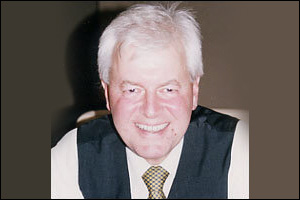 Mr. Karl AlsmarERICSSON Executive Vice President, Central & Eastern Europe,Middle East and AfricaERICSSON Mr. Karl AlsmarERICSSON Executive Vice President, Central & Eastern Europe,Middle East and AfricaERICSSON | 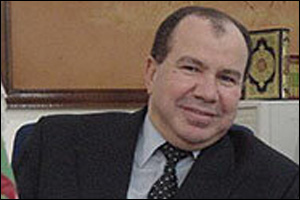 Dr. Said Barkat Ministère de l'Agriculture N/A Dr. Said Barkat Ministère de l'Agriculture N/A |
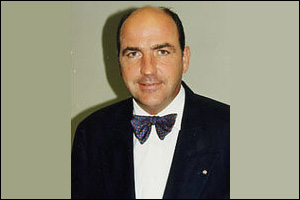 Mr. Alexander GassauerGeneral ManagerSHERATON Mr. Alexander GassauerGeneral ManagerSHERATON | 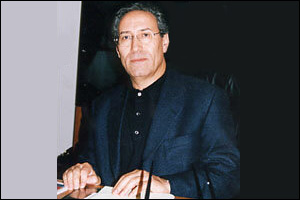 M. Lazhar HaniDirecteur GénéralCMA CGM M. Lazhar HaniDirecteur GénéralCMA CGM | 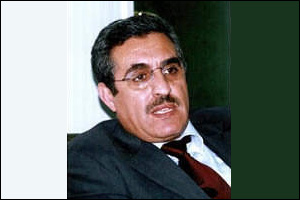 M. El-Hachemi MeghaouiManaging Director of C.P.A. Crédit Populaire D'AlgérieN/A M. El-Hachemi MeghaouiManaging Director of C.P.A. Crédit Populaire D'AlgérieN/A | 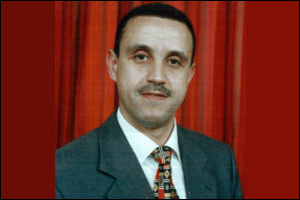 Mr. Arslan ChikhaouiExecutive Director Transactions Nord-SudN/A Mr. Arslan ChikhaouiExecutive Director Transactions Nord-SudN/A |
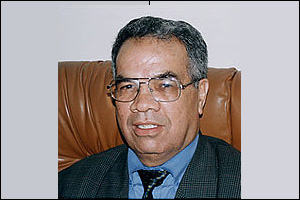 Mr. BenslimaneDirecteur Général HOMELEC Mr. BenslimaneDirecteur Général HOMELEC |  M. Moussa Mouselmal Country Senior OfficerAlcatel M. Moussa Mouselmal Country Senior OfficerAlcatel | 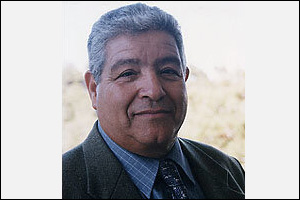 M. Hadibi Président Directeur Général BJSP M. Hadibi Président Directeur Général BJSP |